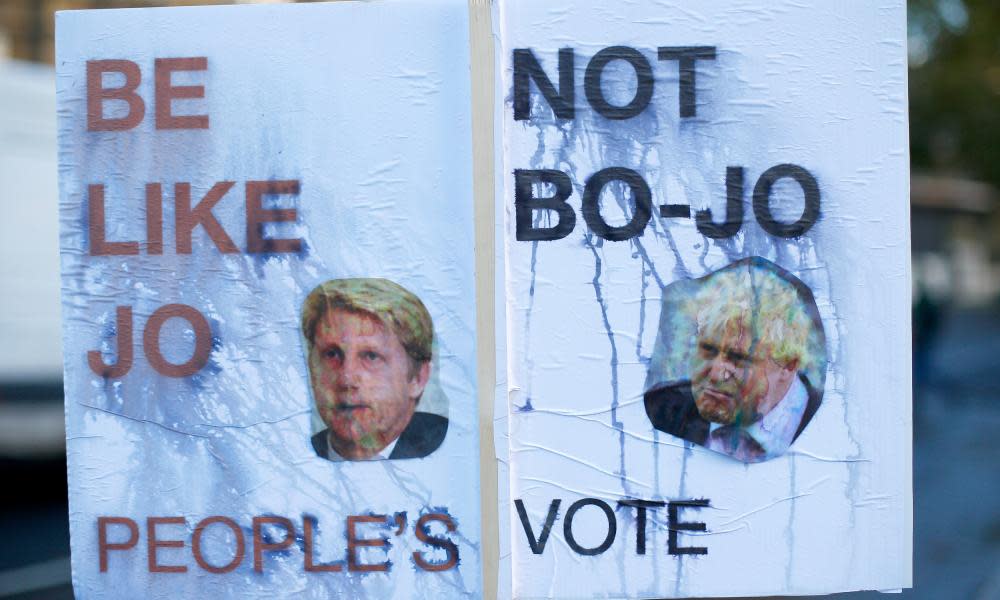Brexit weekly briefing: May's optimism shattered by another resignation

It is make-or-break for Brexit negotiators this week. Until, of course, next week. As Theresa May inches tortuously closer to an apparent deal, we look back at the main twists and turns in our weekly Brexit briefing, which you can subscribe to for free here.
Producing the Guardian’s independent, in-depth journalism takes time and money. We do it because we believe our perspective matters and it may be yours, too. If you value our Brexit coverage, please become a Guardian supporter. Thank you.
Top stories
Negotiators on the UK and EU side were in talks until 2.45am on Monday morning ahead of the EU’s meeting of foreign ministers in Brussels, so Downing Street and Michel Barnier were forced to indicate there had not been the breakthrough they had hoped for.
If an agreement is reached, then an emergency Brexit summit, pencilled in for 25 November will be on. If not, negotiations will continue but the deal, if there is one, cannot be signed off until the pre-scheduled EU council summit on 13- 14 December.
Last Thursday, it was all looking so good: May had opened a “reading room” for her cabinet to see the latest version of the draft withdrawal agreement. Critically, it did not include the words on the contentious Irish backstop.
Dominic Raab even had an epiphany on the road to Dover after he stunned critics by exclaiming he had not understood until recently how important the Dover-Calais route was to Britain’s economy.
But by 10pm, when the first edition of the papers dropped on Thursday, it all started to go downhill.
In what seemed like Groundhog Day, the Democratic Unionist party threatened to pull the plug and vote against May’s deal after a letter from the prime minister to the head of the party, Arlene Foster, suggested the compromise being thrashed out in Brussels did indeed involve some regulatory differences between Northern Ireland and Britain, which the DUP believe amounts to a border down the Irish Sea.
But the letter, which was leaked to the Times in London, could also be read as a sign of new resolve in May: a prime minister trying to square off or even face down the DUP before she signs off in Brussels in order to avoid a repeat of December when the party humiliated her just as she was enjoying lunch with Jean-Claude Juncker to celebrate the ending of the first-phase of negotiations.
Within 24 hours, May had a fresh problem – Jo Johnson, the transport secretary and brother of Boris, quit, describing her Brexit plan as a “terrible mistake” and the biggest “failure of British statecraft” since the Suez crisis in 1956.
This led to a flurry of speculation that other remainer or centralist Tories would join the hard Brexiters and vote against the deal, leaving May’s plans in tatters.
Like Johnson, the former minister Justine Greening said there was no option but a second referendum because the May deal was “handing power” to the EU.
The optimism in Westminster over a semblance of unity caused astonishment in Dublin. It was out of frustration that Leo Varadkar’s deputy, Simon Coveney, went off script to urge caution, again pointing out that a deal in May’s cabinet does not equate to a Brexit deal.
Best of the rest
Gordon Brown calls for royal commission to define new type of Brexit
Brexit can be stopped says Keir Starmer (two days after Jeremy Corbyn said it could not)
British Airways seeks new support for EU shareholder credentials to keep flying after Brexit
Brexit deal not dead despite DUP warning, says David Lidington
German steel giant ThyssenKrupp says Tories have abandoned business. It is a “complete shambles”
May’s Brexit under siege from all sides of the Tory party
Top opinion piece
The prime minister is trying to find a way through a political nightmare, but party discipline is disintegrating around her – Simon Jenkins
To describe a customs union fall-back as vassalage, bondage and enslavement insults both language and history. May’s colleagues are at this critical moment seeking to undermine her attempt to find a way through a political nightmare, and with no proffered alternative. That is anarchy.
A bad Brexit will not be as bad as the Suez crisis, it will be far worse – Andrew Rawnsley
Suez did no lasting damage to Britain; arguably, that fiasco did this country a favour by burning away illusions about its place in the world. Nor was there enduring harm to the Conservative party. The Tories quickly ditched Anthony Eden and went on, under Harold Macmillan, to win a landslide election victory less than three years later.
Top tweet
Lest anyone be deluded over May’s ability to magic a deal in the secrecy of her own cabinet office (Coveney warned that the party was once again talking to itself last Tuesday), my colleague Jennifer Rankin makes the process clear.
It is completely unthinkable Brexit negotiators would agree deal with UK w/o going to EU ambassadors +national capitals for approval.
Hard to say how long this process would take - 7-10 days?- but it can't be ignored. That's why time so short for Nov deal.— Jennifer Rankin (@JenniferMerode) November 12, 2018

 Yahoo News
Yahoo News 
